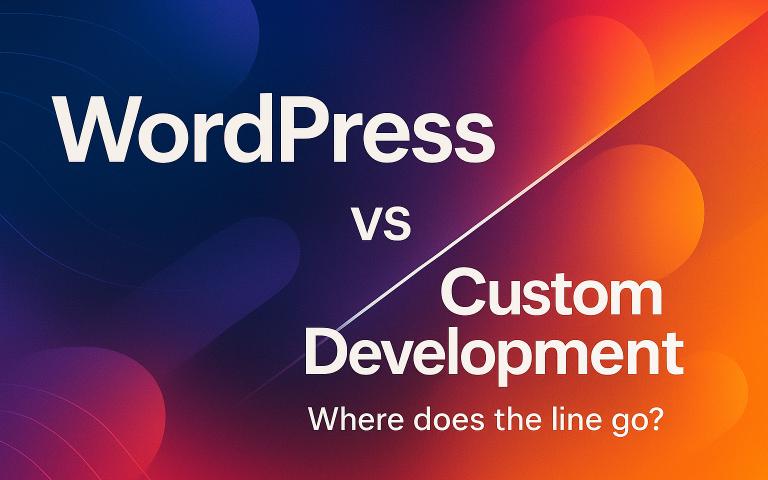WordPress vs Custom Development: Where Does the Line Go?
WordPress is a fantastic tool for blogs and simple websites, but when projects grow beyond publishing content, its limitations quickly show. Custom development offers flexibility, scalability, and long-term value that WordPress can’t always deliver.

WordPress is one of the most popular website platforms in the world. It’s easy to install, comes with thousands of themes and plugins, and has an incredibly active community. For blogs, personal websites, or small company pages, it’s often the perfect fit.
But once projects grow more ambitious, the blogging roots of WordPress start to get in the way.
Strengths of WordPress
- Quick setup — a website can be online in a day.
- Rich ecosystem — plugins for SEO, forms, e-commerce, and more.
- Community support — tutorials, forums, and documentation everywhere.
This makes WordPress ideal for straightforward, content-focused sites.
When WordPress Becomes a Limitation
The challenges begin when your needs go beyond pages and posts:
- Complex business logic: membership portals, unique workflows, advanced user roles.
- Scalability: higher traffic can lead to performance issues.
- Integrations: custom APIs often require messy workarounds.
- Maintenance: dozens of plugins can conflict, creating a fragile ecosystem.
Expanding WordPress is possible, but often feels like patching holes rather than building a strong foundation.
The Case for Custom Development
Custom development (Laravel, Symfony, Statamic, or other frameworks) starts with your business goals — not with a CMS template.
- Architecture built for your needs: no compromises.
- Unlimited flexibility: SaaS platforms, marketplaces, internal tools.
- Clean, scalable codebase: easier to support and grow.
- Seamless integrations: APIs, analytics, internal systems.
- Long-term value: a digital product that evolves with your business.
In short, a custom solution is not just a website for today, but a platform designed for the future.
When WordPress Makes Sense
- Blogs and media sites.
- Landing pages and small business sites.
- Projects with small budgets and short timelines.
When Custom is the Smarter Choice
- SaaS and startups: where the platform is the business.
- Marketplaces and CRMs: complex logic, multiple user types.
- Corporate portals: integrations with internal systems.
- Long-term projects: where performance, scalability, and security are critical.
Our Perspective
At ISAPP, we value WordPress for what it does best: enabling quick and affordable websites. But our real passion lies in building custom digital products.
When your project needs more than just content pages, custom development ensures flexibility, scalability, and growth — without the limitations of a blogging platform.
Conclusion
WordPress is an excellent starting point. But for businesses aiming to scale and innovate, custom development is the more strategic, future-proof choice.
👉 Looking to explore what a custom-built platform could do for your business? Let’s talk.
Get in touch
Need an external audit of Your project?
Tell us your context and the outcome you want, and we’ll suggest the simplest next step.